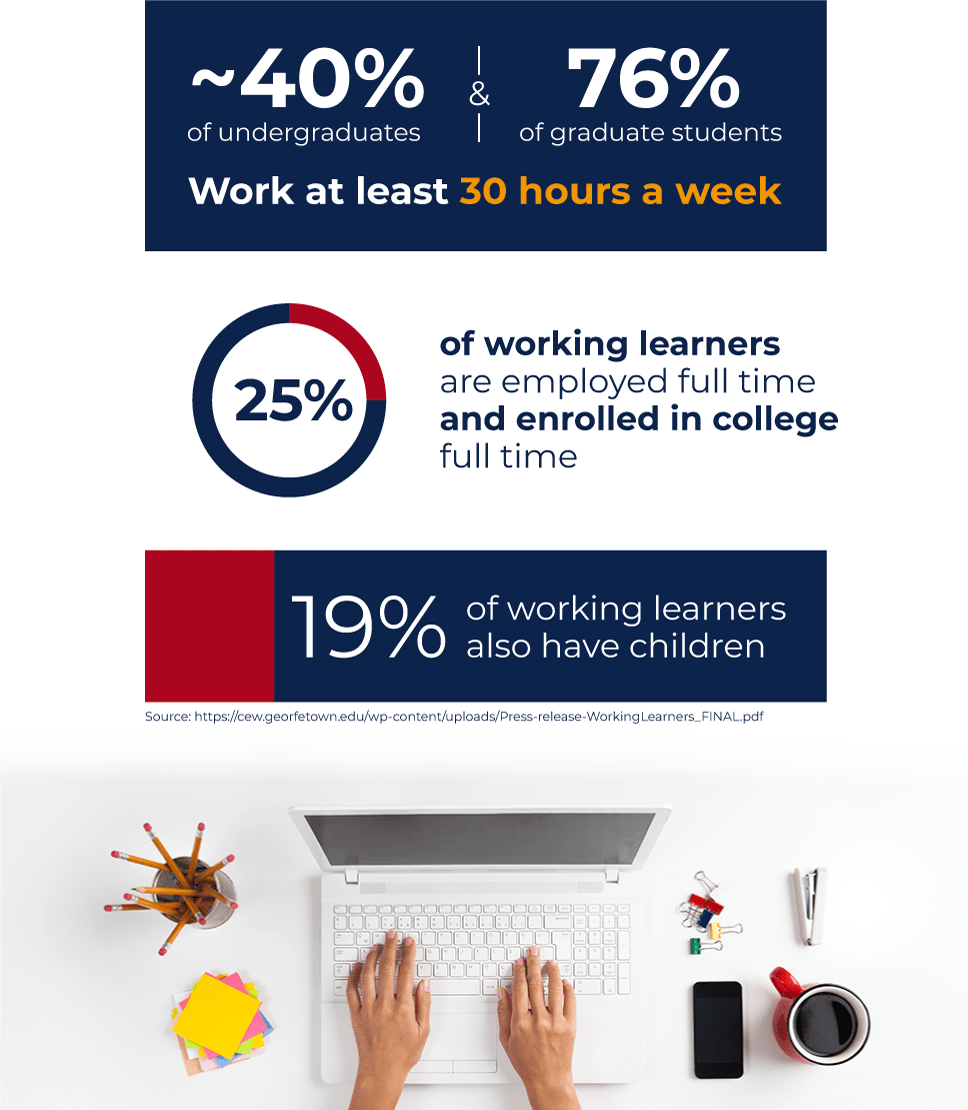College is a big investment. However, unlike a brand-new car or a fancy pair of shoes, your college degree has the potential to aid in contributing back to your savings account over the years. These days, many students decide to work while attending school, an option that not only makes the financial cost of an undergraduate education easier to bear, but may also provide opportunities for on-the-job training and valuable work experience.
If you are considering working and pursuing your degree, consider the following components in order to make the best choice in support of your desired experience.
Working While in College: Pros and Cons
More than 70% of students work during their time of study.
Making the decision to work while in college is not a decision that should be made without understanding fully how that may impact your experience. To start, you should figure out how much your college degree will cost, taking into account not only tuition, but books and materials, as well as your regular expenses, like housing, food, and recurring bills. Aim to map out how much you expect to be paying in total, and then break that down by semester or quarter so you can better align your potential expenses with your income.

Pros of Working While in College
- Opportunity to become more skilled at time management
- Can explore entry level jobs in your field, increasing your experience upon graduation
- Ability to apply theoretical coursework in a practical setting
- Opportunity to offset cost of degree, potentially requiring fewer student loans
Cons of Working While in College
- Managing requirements in class and at work can become stressful
- Ability to immerse yourself in the college experience could be limited based on real-world expectations
- Difficulty making time for group projects and studying could negatively impact grades
- Less time available to spend with family and friends as college and work are the priority
Related: 4 Ways an Online University Can Save You Money
Working While in College Statistics
According to a 2015 report by Georgetown University Center on Education and the Workforce, for the past 25 years, more than 70% of students have also worked during their time of study. In addition to earning money, those who work while in school are also potentially gaining relevant experience to their future career path by developing a set of professional skills that many employers are looking for post-graduation. According to NACE’s Job Outlook 2017 survey, “nearly 91% of employers prefer that their candidates have work experience” and only “5% say that work experience is not a factor when hiring new graduates."

While working during school may help offset some of the costs of a student’s education, it’s also likely that this income isn’t enough to support the entire cost of school plus life, since a full-time job at minimum wage would equate to approximately $15,080 per year. While higher-paying jobs would support a student financially at a higher rate, that job may be more taxing. This dilemma brings to the forefront of importance the need to supplement paying for an education from additional means.
Scholarship, Financial Aid, and Other Opportunities
Before you start searching for a job, or thinking about quitting the one you have, make sure you have a full grasp of all the different ways you can supplement paying for college.
For example, some employers offer financial assistance to employees pursuing a college degree, so be sure to ask if your company offers tuition assistance for UAGC. There are also various scholarships and grants you can apply for.
The Full Tuition Grant offered through the University of Arizona Global Campus which, when combined with an approved company’s tuition assistance program, lets eligible students earn their degree at a lower cost.
For federal financial aid assistance, you may find you are eligible for a mix of grants, loans, and even work-study hours, which typically are paid at minimum wage. Of course, a variety of different institutions also award scholarships to qualified students who apply, so investigate opportunities that you find. Finally, if you’ve been in the military, be sure to explore specific programs that reduce tuition for military veterans.
Whichever direction you choose, know that much of success is about mindset and your own commitment to achieve your goals. For more specific questions about financial aid opportunities at Global Campus, take a look at our financial aid section, or call 1.866.711.1700 to speak to a representative.
